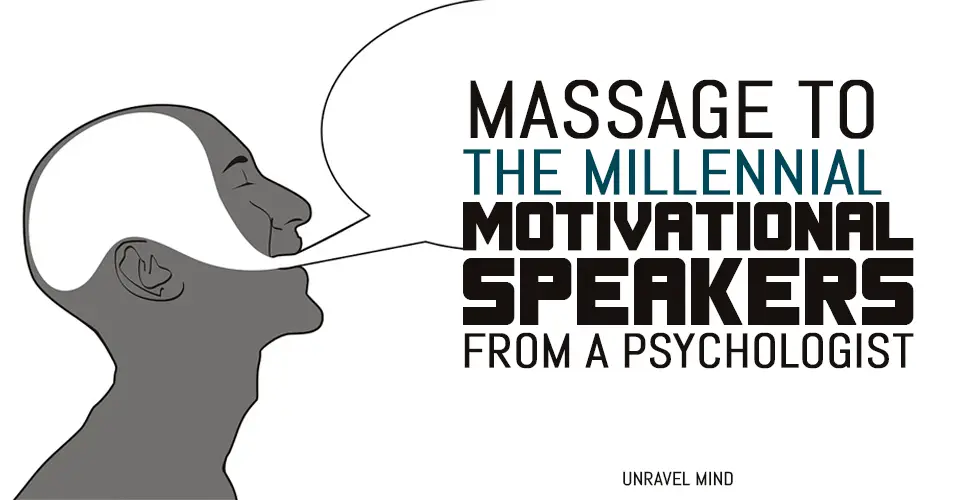With the exceeding number of motivational speakers this era has seen, there should be more successful, immensely motivated youth with greatly uplifted sense of self-satisfaction. But that mostly is not the case. Let me get this straight, it doesn’t matter what they call themselves – ‘motivational speakers’, ‘inspirational guru’- ‘influencers’, most of these people are stretching the truth too far. There’s no denying that the catchphrases they use are compelling and there seems to be a ring of truth to it. But why invest to hear just the truth, the truth that’s right in front of your eyes, from someone else?
Most motivational speakers are not being charitable on social media platforms but are subliminally promoting their agenda. Motivational speakers have great communication skills – they know how to sound convincing and tell you exactly what you wish to hear. That is exactly why some of their speeches temporarily pump us up and are reinforcing enough to keep us getting back to them. Stories of how people overcame massive obstacles in their lives and have been incredibly successful despite circumstances are unequivocally inspiring. But these stories alone cannot light the fire in us to achieve anything in life.

Even though motivation can be defined as the ‘willingness to do something’ but this urge is driven by unique needs in different people. Not everyone is motivated to achieve money, fame, and success, which is the common theme of every motivational speech. After a while these motivational thoughts propagated by these speakers weigh heavy on us, especially if we religiously follow them without an intrinsic sense of motivation. Lazing around and watching TED talk shows, procrastinating on your next assignments will never get you motivated enough unless you really feel driven with interest to actually complete them.
Luckily, there are professionals with scientific knowledge and experience who can give us empirically tested techniques to motivate ourselves. But mere sermons like “Fake it till you make it”, “get up and get it done”, “failure is the key to success”, “start somewhere’ doesn’t really help us in the long go. These subjected, self-beneficial ideals might backfire for other individuals with dynamic personalities and unique problems. It is too vague of a statement to even instigate a person to maneuver.
The tone of most motivational speakers is over optimistic, sometimes brazenly inclining towards pseudo-positivity which brings home the idea that suffering, pain, and unhappiness are utterly iniquitous. This ignites a sense of guilt and shame in the already vulnerable mass. Weirdly, the world of motivational speakers is always dark in the beginning half and comparatively rosier in the second, and often this transition happens with a sudden transformation of their mindset which is paradoxical to their previously vulnerable self – “Never let other people know your weakness. Be strong in the face of hardships.” This doesn’t only minimize other people’s pain but also encourages people to ignore, avoid, suppress their emotional experiences, and dehumanize themselves. Avoiding emotional catharsis will only make the journey to one’s goals more tiresome as it subconsciously keeps influencing your actions. Such statements made by motivational speakers are unrehearsed and a callous attempt at providing guidance to people. All in all, these videos, talk shows promote stoicism, coaxing us to believe that success is directly proportional to one’s ability to restrict one’s affect.
Here are two of my messages to motivational speakers who genuinely want to make a difference in someone’s life:
1.Research your claims:
Statements from a person of position and power often have more weight than one can assume. When you are connecting to a crowd who perceive you as a knowledgeable, competent expert giving efficacious advice on life problems, you have to be extra careful with the information you provide to them. You could be deluding them and have no clue about the impact it might have on their lives. Empirical data are more reliable and they are tested hypotheses reached through experiments against controls.
Verify what you are preaching. Review your content. Is your content:
- practical, constructive, and backed by empirical findings?
- only based on anecdotal evidence?
- overshadowed by subjective opinion?
- regressive, restrictive, and quasi-abusive?
- biased, misleading and negatively inclined?
Your content is your responsibility. The content might contain excerpts of your personal experience but it should not overshadow the essential information you are providing. People are entrusting you with their money and time. Make it worth their while.
2.There is no one clean-cut solution for all:
The ‘tested’ path to success that you sell on various platforms is ‘tried and tested’ in your case and is just as hypothetical in other people’s cases. The context of the problem might be similar to your own but there is clearly no one ultimatum solution to all problems – your devised solution might not fit for the problem your viewers typically have. Not to overlook that some of your motivational speeches might actually induce pessimism in people who are already discouraged and spiritually shattered. This is because your stories sell lies about success – it’s easily achievable, the only thing you really need to do is work your fingers to bones, no other factors matter. Success is defined differently by different people. For some of us, success isn’t just about recognition and money. This restricted view of success doesn’t encapture the entire picture. Communicate an innovative approach to deal with problems.
Motivational speakers will soon be dead unless they work up their art. Some motivational speakers are downright capitalists, insouciantly selling their cause with no regard for viewers and their well-being while the others are spewing mediocrity. Motivational speakers soon need to come out with their authentic, signature, well-researched contents to make a discernible difference to the mass.
Read more
The Rise of Psycho-Quacks (Fake Psychologist) in India: Why Should Indians Worry About it?
Pin it



